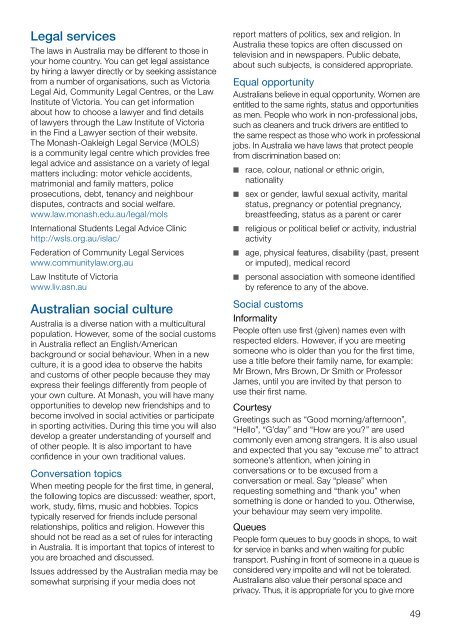Destination
You also want an ePaper? Increase the reach of your titles
YUMPU automatically turns print PDFs into web optimized ePapers that Google loves.
Legal services<br />
The laws in Australia may be different to those in<br />
your home country. You can get legal assistance<br />
by hiring a lawyer directly or by seeking assistance<br />
from a number of organisations, such as Victoria<br />
Legal Aid, Community Legal Centres, or the Law<br />
Institute of Victoria. You can get information<br />
about how to choose a lawyer and find details<br />
of lawyers through the Law Institute of Victoria<br />
in the Find a Lawyer section of their website.<br />
The Monash-Oakleigh Legal Service (MOLS)<br />
is a community legal centre which provides free<br />
legal advice and assistance on a variety of legal<br />
matters including: motor vehicle accidents,<br />
matrimonial and family matters, police<br />
prosecutions, debt, tenancy and neighbour<br />
disputes, contracts and social welfare.<br />
www.law.monash.edu.au/legal/mols<br />
International Students Legal Advice Clinic<br />
http://wsls.org.au/islac/<br />
Federation of Community Legal Services<br />
www.communitylaw.org.au<br />
Law Institute of Victoria<br />
www.liv.asn.au<br />
Australian social culture<br />
Australia is a diverse nation with a multicultural<br />
population. However, some of the social customs<br />
in Australia reflect an English/American<br />
background or social behaviour. When in a new<br />
culture, it is a good idea to observe the habits<br />
and customs of other people because they may<br />
express their feelings differently from people of<br />
your own culture. At Monash, you will have many<br />
opportunities to develop new friendships and to<br />
become involved in social activities or participate<br />
in sporting activities. During this time you will also<br />
develop a greater understanding of yourself and<br />
of other people. It is also important to have<br />
confidence in your own traditional values.<br />
Conversation topics<br />
When meeting people for the first time, in general,<br />
the following topics are discussed: weather, sport,<br />
work, study, films, music and hobbies. Topics<br />
typically reserved for friends include personal<br />
relationships, politics and religion. However this<br />
should not be read as a set of rules for interacting<br />
in Australia. It is important that topics of interest to<br />
you are broached and discussed.<br />
Issues addressed by the Australian media may be<br />
somewhat surprising if your media does not<br />
report matters of politics, sex and religion. In<br />
Australia these topics are often discussed on<br />
television and in newspapers. Public debate,<br />
about such subjects, is considered appropriate.<br />
Equal opportunity<br />
Australians believe in equal opportunity. Women are<br />
entitled to the same rights, status and opportunities<br />
as men. People who work in non-professional jobs,<br />
such as cleaners and truck drivers are entitled to<br />
the same respect as those who work in professional<br />
jobs. In Australia we have laws that protect people<br />
from discrimination based on:<br />
n race, colour, national or ethnic origin,<br />
nationality<br />
n sex or gender, lawful sexual activity, marital<br />
status, pregnancy or potential pregnancy,<br />
breastfeeding, status as a parent or carer<br />
n religious or political belief or activity, industrial<br />
activity<br />
n age, physical features, disability (past, present<br />
or imputed), medical record<br />
n personal association with someone identified<br />
by reference to any of the above.<br />
Social customs<br />
Informality<br />
People often use first (given) names even with<br />
respected elders. However, if you are meeting<br />
someone who is older than you for the first time,<br />
use a title before their family name, for example:<br />
Mr Brown, Mrs Brown, Dr Smith or Professor<br />
James, until you are invited by that person to<br />
use their first name.<br />
Courtesy<br />
Greetings such as “Good morning/afternoon”,<br />
“Hello”, “G’day” and “How are you?” are used<br />
commonly even among strangers. It is also usual<br />
and expected that you say “excuse me” to attract<br />
someone’s attention, when joining in<br />
conversations or to be excused from a<br />
conversation or meal. Say “please” when<br />
requesting something and “thank you” when<br />
something is done or handed to you. Otherwise,<br />
your behaviour may seem very impolite.<br />
Queues<br />
People form queues to buy goods in shops, to wait<br />
for service in banks and when waiting for public<br />
transport. Pushing in front of someone in a queue is<br />
considered very impolite and will not be tolerated.<br />
Australians also value their personal space and<br />
privacy. Thus, it is appropriate for you to give more<br />
49


